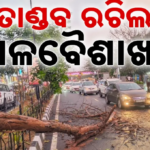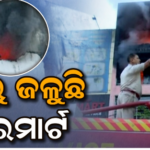Delhi continues to gasp for air as smog shrouds city, reducing visibility
NEW DELHI, NOV 19: Thick grey haze choked Delhi for the third straight day on Tuesday, with the pollution levels remaining alarmingly high at 488 in the ‘severe plus’ category.
Calm winds and dropping temperatures made the dispersion of pollutants difficult and the cold air traps dust and smoke from stubble burning in neighbouring areas of Delhi.
The city recorded its coldest night of the season so far on Monday, with the mercury dropping to 12.3 degrees Celsius from 16.2 degrees Celsius the night before, according to the India Meteorological Department (IMD).
Delhi’s Air Quality Index (AQI) was recorded at 488 at 9 am, according to Central Pollution Control Board (CPCB) data. Out of the 32 monitoring stations in the capital, 31 recorded AQI levels exceeding 480.
Two stations, Alipur and Sonia Vihar, maxed out at 500.
Meanwhile, the trains’ movement continues amid smog in Delhi. Visuals from New Delhi Railway Station also show a layer of haze covering the area. 22 trains have been running late and 9 trains have been rescheduled as a result of the smog, said the Railways.
As pollution levels remain high, a thick froth of toxic foam continues to float in sections of the Yamuna river near Kalindi Kunj and Okhla Barrage.
The residents of Delhi continue to raise alarms as air quality levels in many areas remain in the “severe plus” category in multiple areas.
On Monday, Delhi recorded its second-worst air quality in six years with the AQI touching 494.
Delhi’s air quality first entered the ‘severe plus’ category on Sunday, prompting the implementation of tighter pollution control measures under Stage IV of the Graded Response Action Plan (GRAP) the next morning.
Under the GRAP Stage 4 restrictions, no trucks are allowed into Delhi except those carrying essential items or using clean fuel (LNG/CNG/BS-VI diesel/electric). Non-essential light commercial vehicles registered outside Delhi are also prohibited, except for EVs, CNG and BS-VI diesel ones.
All construction activities, including highways, roads, flyovers, power lines, pipelines and other public projects, are suspended.
First implemented in 2017, the GRAP is a set of anti-air pollution measures followed in the capital and its vicinity.
Based on the severity of the situation, it classifies the air quality in the Delhi-NCR under four different stages — Stage 1: ‘poor” (AQI 201-300); Stage 2: ‘very poor’ (AQI 301-400); Stage 3: ‘severe’ (AQI 401-450); and Stage 4: ‘severe plus’ (AQI above 450).
Vice President of Meteorology and Climate Change, Skymet Weather, Mahesh Palawat said the combination of dense fog in Punjab, Haryana and Delhi coupled with slow northwest winds is trapping pollutants in the air.
“The dropping temperatures are causing cold winds to push pollution closer to the surface. Without an increase in wind speed, a significant improvement is unlikely over the next two to three days. However, rain is expected later this week and it could help reduce pollution levels,” he said.
Fog reduced visibility to 400 meters on Tuesday morning, and it is likely to persist during the day, the IMD said. The humidity levels were recorded at 89 percent at 8.30 am. The maximum temperature is expected to settle at 24 degrees Celsius, it said.
Terming the situation a “medical emergency,” the Delhi government urged institutions to adopt urgent measures to safeguard public health. As a precaution, several schools and colleges across the NCR have switched to online classes, with in-person attendance suspended for students in Classes 10 and 12 until further notice.
Delhi University and Jawaharlal Nehru University (JNU) have also decided to suspend physical classes and hold classes online till November 22.
-PTI





